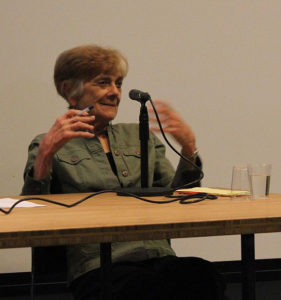Humanist Women in History: Frances Fox Piven
March is Women’s History Month in the United States, the UK, and Australia. In commemoration we bring you the second of our five-part series: “Humanist Women in History.” The first, on Shirley Chisholm, the first African-American woman elected to the US Congress, is available here.
“I think that the question of how power can be exerted from the lower reaches has never been more important. It will ultimately determine whether another world is indeed possible.”
—Frances Fox Piven, American Sociological Review, February 2008
Activist and academic Frances Fox Piven was born in 1932 in Calgary, Canada, to Russian immigrants. Shortly after, the family moved to the United States, and in 1953 she was naturalized as an American citizen, the same year she received her first degree from the University of Chicago. She excelled at her alma mater, later obtaining both a master’s and a PhD there.
Her first marriage was to Herman Piven, with whom she had a daughter and who she later divorced. After working briefly as a city planner in New York, Fox Piven joined one of the country’s first anti-poverty agencies, Mobilization for Youth, as a research associate. She collaborated with Columbia University professor Richard Cloward, writing about the welfare state. The two eventually married and were together until his death in 2001.
In 1966 Fox Piven and Cloward authored the now famous “The Weight of the Poor: A Strategy to End Poverty,” in the Nation, boldly advocating for a welfare enrollment drive to overwhelm the system and expose gaping holes in the social safety net for the unemployed poor. Today the nuance of the proposal, commonly referred to as the “Cloward-Piven strategy,” is lost amid debate about their admittedly strident objective “to wipe out poverty by establishing a guaranteed annual income.”
More recently Fox Piven became something of a symbol for big government gone bad. Right-wing talking heads have baldly misrepresented her ideas, most notably Glenn Beck, with assertions that she is “an enemy of the Constitution” seeking to destroy the US economy and the federal government. At age seventy-nine, Fox Piven began receiving credible death threats in the mail and was forced to go to the police. Writing about it in the February 8, 2011, Guardian, Fox Piven concluded:
By telling simple fairy tales that trace these big and complex changes to the machinations of particular people, Beck makes the changes comprehensible in a way, and also makes the people who are presumably responsible the targets of his listeners’ frustration and outrage. Partly because it is utterly irrational, and partly because it is an effort to bully and intimidate his political opponents, this is dangerous for democratic politics.
Fox Piven has consistently been on the front lines of humanist causes and will be remembered for her many other achievements. In 1968 she publicly refused to support the Vietnam War with her tax dollars. She co-founded Human SERVE (Service Employees Registration and Voter Education) and was instrumental in promoting the now common practice of “motor voter registration” and in passing the National Voter Registration Act of 1993.
Fox Piven is regarded as a preeminent expert in political science and political economy. In the 1960s and ’70s she taught at Columbia and Boston University, and, since 1982, at the Graduate Center, City University of New York. Her books include Regulating the Poor: The Functions of Public Welfare (1971), Poor People’s Movements (1977), Why Americans Don’t Vote (1988), and Challenging Authority: How Ordinary People Change America (2006).
Elected president of the American Sociological Association in 2007, Fox Piven was praised by Barbara Ehrenreich as “an intellectual star.” The honor came in addition to the prestigious Guggenheim Fellowship, the C. Wright Mills Award from the Society for the Study of Social Problems, a Lifetime Achievement Award from the American Sociological Association, and numerous others.
On the topic of faith, Fox Piven says: “I have no religious affiliation or inclination.” And so it could be rightly said that her inclination to help the poorest and most defenseless among us and her affiliation with the great social reformers of this and the last century come naturally.

